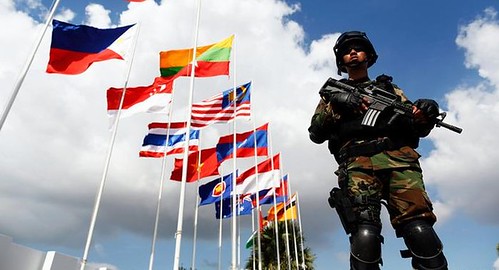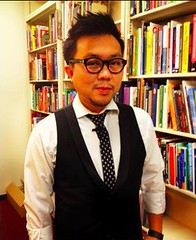Leaders of the Association of Southeast Asian Nations (ASEAN) meet every year. They often share an upbeat outlook on ongoing regionalization, which will witness the grouping celebrate a milestone in its community building in 2015. In looking closely into the region however, underneath such optimism lies an inconvenient truth. In Southeast Asia, existing political flashpoints have the potential to hamper the path toward an ASEAN community. The seeming inability of ASEAN to manage regional disputes has so far symbolized a failure in the strengthening of its regional architecture. An important question is therefore how ASEAN might thrive amid persistent regional conflicts.
ASEAN has many stories of success, from overcoming an inimical attitude among its members in the past, to the impressive institutionalization process with the implementation of its charter in 2008. But political unrest in the region and the overlapping claims of disputed areas have put ASEAN to the test, particularly in its effectiveness in using the dispute settlement mechanism.
The Political and Security Community is one of the pillars of the overall ASEAN community. The objectives are admirable. It seeks to bring ASEAN’s political and security cooperation to a higher plane, so that members can live in peace with one another and with the world. It also encourages political development in adherence to the principle of democracy, rule of law and good governance, as well as the protection of human rights. Moreover, it aims at reinforcing ASEAN’s relations with dialogue partners and other countries, while emphasising its comprehensive approach to security, the renunciation of the use of force and the promotion of peaceful dispute settlement.

Territorial dispute over the South China Sea represents one of the region’s flashpoints
Yet, the protracted Thai political conflict, the garment workers strikes and periodic political protests in Cambodia, the minority problems in Myanmar, and the separatist movements in Thailand’s restive south and the southern Philippines—all have cast doubt over ASEAN’s commitment in finding long-lasting solutions to these internal political crises. Challenges also come in the form of bilateral and multi-party conflicts, as seen in the case of the territorial disputes over the Preah Vihear between Thailand and Cambodia and in the South China Sea.
In the case of the South China Sea dispute, not only have the four ASEAN members, Vietnam, the Philippines, Malaysia and Brunei, engaged in overlapping claims of ownership, ASEAN has also been at loggerheads with China—one of the claimants—which prefers to solve the problem on a bilateral basis. The conflict in the South China Sea has seriously jeopardized peace and stability in the region. It could also tear up ASEAN’s solidarity, as recently witnessed during the ASEAN Meeting in Phnom Penh in July 2012. For the first time in its 45-year history, ASEAN’s Foreign Ministers failed to issue a joint communiqué on the effort to solve the South China Sea dispute.
ASEAN has a number of dispute settlement mechanisms, such as the principle contained in the ASEAN’s Treaty of Amity and Cooperation (TAC), including “settlement of differences and disputes by peaceful means” and “renunciation of the threat or the use of force”, Article 23 of the ASEAN Charter, which allows the parties to a dispute “to request the Chairman of ASEAN or the Secretary-General of ASEAN to provide good offices, conciliation or mediation”, as well as the ASEAN Political-Security Community Blueprint, which calls for prevention of disputes and conflicts from arising between member-states.
On top of this, ASEAN can nominate a mediator to provide necessary facilities as part of the settlement of disputes. For example, Indonesia was assigned as an observer in the Preah Vihear conflict, which illustrated a certain degree of leadership on the part of ASEAN as well as Indonesia’s diplomatic activism. The role of mediator can be crucial: To assist and support the parties in representing their commitment to avoid armed clashes between them, by observing and reporting accurately, as well as impartially on complaints of violations and submitting its findings to each party through the current Chair of ASEAN. But ultimately, the recipe for the success in exercising the dispute settlement mechanisms is nothing more important than a political commitment of the parties in the conflict.
Regarding domestic political problems, ASEAN needs to rethink its approach and get itself out of the old dilemma—yearning to prove its seriousness in dealing with the problems but being held back by the traditional rule of non-interference. To be fair, ASEAN has come a long way in its attempt to water down the non-interference principle. The establishment of ASEAN’s Inter-governmental Commission on Human Rights (AICHR) was a major step toward recognizing the importance of real engagement in ASEAN countries’ internal crisis. ASEAN must come to terms with the fact that what occurs in one country will not limit itself within a national border, but could bring transnational ramifications. Thus, the option of the non-interference principle shall not be rigidly set in stone.
At the end, to materialize the Political and Security Community, ASEAN may wish to swallow some bitter pills through a series of organizational reforms. First, its internal organization must undergo readjustments, such as the acknowledgement of the importance to give greater authority to the ASEAN Secretariat, including the ASEAN Secretary-General. This would allow ASEAN’s manoeuvring of regional conflicts more effectively and authoritatively.
Second, ASEAN may consider creating a Political and Security Community scorecard to prioritize its obligations as short-term goals, and to monitor the capability of regional instruments in order to establish a realistic rule-based institution as a long-term project. Finally, ASEAN must forge a greater engagement with civil society organizations, especially to give more weight to the task of protecting human rights and promoting a better livelihood for ASEAN citizens.

Pavin Chachavalpongpun is associate professor at Kyoto University’s Centre for Southeast Asian Studies.
Prachatai English is an independent, non-profit news outlet committed to covering underreported issues in Thailand, especially about democratization and human rights, despite pressure from the authorities. Your support will ensure that we stay a professional media source and be able to meet the challenges and deliver in-depth reporting.
• Simple steps to support Prachatai English
1. Bank transfer to account “โครงการหนังสือพิมพ์อินเทอร์เน็ต ประชาไท” or “Prachatai Online Newspaper” 091-0-21689-4, Krungthai Bank
2. Or, Transfer money via Paypal, to e-mail address: [email protected], please leave a comment on the transaction as “For Prachatai English”
